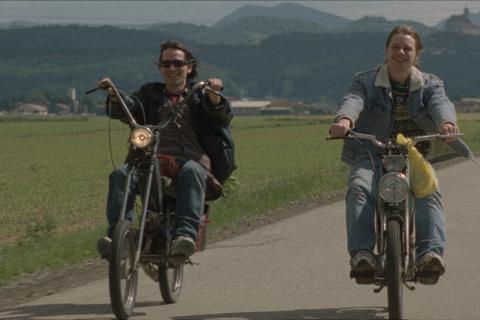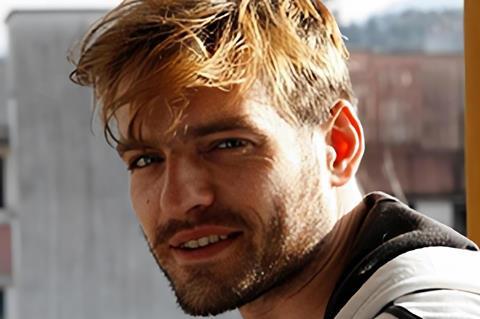
Slovenian writer and director Dominik Mencej premiered Riders, his feature debut, in the feature competition of this month’s Sarajevo Film Festival.
The young director, who graduated in Film and Television Directing at the University of Ljubljana, won the awards for Best Director and Best Screenplay at the 2014 Festival of Slovenian Film in Portorož with his short film The Springtime Sleep.
Riders follows two young friends from a small Slovenian village who, with the year 2000 rearing into view, decide to get on the road and ride their mopeds through Croatia and Slovenia. Though haunted by different fears and seeking salvation in different ways, both are driven by a shared desire to find true liberty and break with stifling convention on the trip of a lifetime.
Riders was produced by Staragara (Slovenia), Antitalent (Croatia), Sense Production (Serbia), Transmedia Production (Italy), Novi Film (Bosnia and Herzegovina), and RTV Slovenia. Producers include Miha Černec, Danijel Pek, Milan Stojanović, Igor Prinčič, Srdjan Šarenac, and Jožko Rutar.
What inspired you to make this film?

The first idea came from my producer, Miha Černec, but it was less than an idea: he was just fascinated with this phenomenon, in Slovenia, of people blessing their motorbikes. Most of the bikers have all of these weird, satanic symbols on their bikes, like skulls and the number 666, but then they go in front of the church where the priest blesses their bike. It happens around Easter, and it’s like the beginning of the season for motorbikes, so this is a blessing for the road. So, he contacted me, and we developed it into a story which still has this element in it, but doesn’t revolve around it.
Why set the film in 1999?
1999 was obviously the end of the millennium, it felt like a new era was coming. It is also a time I’m kind of nostalgic about, I was growing up then and, finally, some doors were opening in my life. But this particular year is also important for the Balkan region because the war was kind of ending in some parts, it was still going on in some places, but in others there was a lot of optimism for the future. I think it correlates well with the story of my main characters: they are trying to find freedom, they are escaping to find something new.
How did the project come together in terms of funding?
We always knew that the characters would travel through Slovenia and Croatia, so it was logical to get into co-production with these countries.
A big part of the film is set in Croatia, but we didn’t get funding from there at first. So, we went into shooting with about half of the crew and half of the locations in Croatia without the Croatian funding, which was kind of a setback. But later on, we got funding from Croatia for post production, so it kind of evens out. We couldn’t wait another year or half a year for another fund, we needed to go shooting.
How did you go about assembling the cast?
In terms of casting, I like to write with people in mind. It was really early on that I knew I wanted Petja Labovic and Timon Sturbej for the main roles. I knew them from the Academy. They’ve been friends in real life since they were little, so I knew they would have the necessary chemistry on screen. They are also from a place close to where the characters come from, and this area has a really strong dialect. They studied the dialect for a year and got really good at it. I had worked with Anja Novak before on my student film, and I imagined her in her role when I was writing. The role played by Nikola Kojo was essentially written for him, but we weren’t sure we would get him. So, we were really happy when it worked out.
What were the most challenging aspects of the shoot?
The main one was that it’s a road movie, so no two locations are the same and you’re always on the move. It’s really hard to film everything and the weather is always changing. The other challenge was the research about the time and place in which the film is set. I’m not from those parts of Slovenia, but my wife, Deanna, comes from somewhere close to that area and helped a lot. We travelled to those places many times to find out the stories of the people there. It was also a challenge to portray that era realistically.
What are you working on now?
I have a first draft for another feature and have applied for some pre-production funds. It is also a rural story set in a secluded part of Slovenia and in the past, but in the 1970s-1980s. In that area: many people were moving away, only the oldest sons would stay on the farms to work, and they needed wives. The story revolves around a bride who comes from Zadar [in Croatia], where farms were mainly producing potatoes, apples and things like that, which they would sell in other villages. This trade route then went the other way when the brides started to come to Slovenia, thinking this would be a better life for them. It may have been a little better, but there were other problems to deal with: a completely new language, a new culture, even a new religion.
The film focuses on a young woman who gets married into a family with a mother in law who has a lot of power in the family dynamic. She has to deal with that, and with all of the difficulties of the area. It’s about her struggling to find her place in that world. And it becomes a bit metaphysical, too. The working title in Slovenian means “potato bride,” because that’s actually what the locals in Brkini were calling these brides. The other name for them was “dalmatian brides,” because of the Dalmatian region in Croatia. My wife is a co-writer on that project. She didn’t write Riders, but she was involved from the start to the end, so she had a big editorial influence on it.

























No comments yet